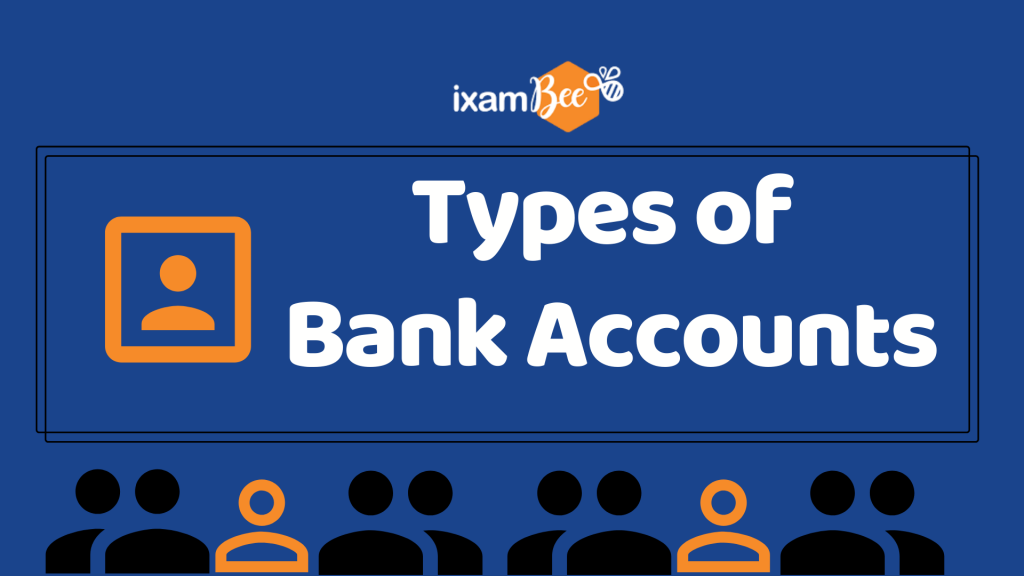A ‘bank account’ is an agreement negotiated with a bank, acting as a safe place for hard-earned cash in return for certain terms and conditions based on the type of account one selects. The agreement entails the bank holding funds and allocating an account number for purposes of transactions. In other words, ‘account’ refers to the ledger where all financial information is kept. Banks, on their part, pay interest on the money deposited, encouraging customers to keep their money in the bank for a long time.
For banking exam candidates, thorough knowledge of bank accounts is a must. This article gives detailed information about the types of bank accounts in India, including categories like accounts for NRIs, distinguishing current accounts, and legal aspects of banking. The details and characteristics of these accounts form a major part of the General Awareness syllabus for national bank exams.
Banking exam aspirants are motivated to use this detailed source, providing information on subjects such as Hindi types of bank accounts, PDF download, and details about top banks like SBI, ICICI, and HDFC. Through complete usage of this article, the candidates can support their knowledge regarding the plethora of bank account varieties in India.

In addition, ixamBee provides courses that are crucial in preparing candidates for bank exams. The courses give students the necessary knowledge for answering questions concerning bank account types and offer an all-around method of exam preparation. ixamBee’s materials help aspirants navigate the competitive nature of bank exams and prepare them accordingly.
Essentially, this blog highlights the significance of banks in providing varied account types and stresses the significance of thorough exam preparation via platforms such as ixamBee, especially for those encountering questions pertaining to various bank account types in banking exams.
Benefits of a Bank Account
A bank account provides several benefits beyond the mere deposit and withdrawal of money. In the current economy, a bank account is a core mechanism of managing one’s own money, allowing people a safe and easy way to hold, build, and access their finances. In this article, the complex advantages of bank account ownership are analyzed from the benefits of economic safety and ease of access to possible investments and expanded financial services availability. Some of the benefits of having a bank account are as follows:
- Financial Safety and Security: A bank account offers a safe location to store your money. Banks use sophisticated security features to keep your money safe, minimizing the chances of theft or loss that come with having cash at home.
- Easy Transactions: Bank accounts facilitate easy financial transactions, where you are able to pay bills, send money, and make purchases easily. This ease makes it easy to handle daily financial operations and minimizes the need to deal with cash.
- Interest and Investment Prospects: Saving accounts usually earn interest, where your money accumulates over time. Opening a bank account also provides access to different forms of investments, enabling you to consider other alternatives beyond simple savings.
- Establishing Credit History: Having a bank account helps in establishing a good credit history, an important consideration for securing loans or credit cards. Your credit history shows your responsibility as a payer and increases your creditworthiness overall.
- Access to Banking Services: A bank account provides you with access to numerous financial services, such as loans, mortgages, and retirement accounts. All this increased access enables you to tap into more resources for important life milestones or long-term financial objectives.
- Electronic Banking Improvements: Thanks to technology, electronic banking has become the norm. Online transactions, mobile banking, and electronic payments are enabled through bank accounts, which provide a comfortable and effective means of managing your money in this age of digital life.
How to Open a Bank Account
It is easy to open a bank account and can be described in a couple of simple steps. From comparing the best banks to being given important documents such as passbooks and ATM cards, here are the nine simple steps to start your banking experience without any hassle.
- Bank Research: Look up top banks extensively, keeping in mind their reputation, customer support, and interest rates. Contrast facilities provided by various banks, going through reviews by customers for information on their services. Opt for a bank that not only meets your monetary objectives but is also reputed for its reliability and good customer experience.
- Selecting the Proper Bank: Go to the closest branch of your selected bank and enquire about the nature of accounts they offer. Ask bank officials to know the details about account options and choose one that is best for your financial requirements and lifestyle.
- Filling Account Opening Form: Fill the account opening form with correct personal information and complete all the sections as necessary. Carefully verify the details to prevent delay or problems during the verification process.
- Presenting ID Proof: Ensure you submit a clear and valid copy of identification proof along with the account opening form. This is a very important step for the identity verification process and in fulfilling the regulatory obligations of the bank.
- Introducer Requirement: Find a credible introducer who is a current bank customer. Request their assistance to sign as an introducer on your account opening form, helping establish trust with the bank.
- Submission and Verification: Present the filled form and accompanying documents to the bank officer for verification. Prepare to respond to any further questions they have while verifying.
- Initial Deposit: Make the designated initial deposit to open your selected account. Check with the bank regarding the modes of payment that are acceptable and any other requirements for the initial deposit.
- Issuance of Documents: As soon as the bank approves your account, it will issue a passbook, checkbook, and an ATM card. Provide your choice in the application form for these documents so that they match your banking needs.
- Account Activation: On completing all the required formalities, your preferred bank account shall be activated. Make the best use of all the facilities available at the bank, and explore the provisions of the new bank account.
Types of Bank Accounts
Banking provides several types of accounts designed to suit different financial requirements. Familiarity with the categories of bank accounts is important to making smart money management and essential financial service decisions. Let us now examine the complexity of account categories, ranging from savings and current accounts to fixed deposits and specialized accounts, offering useful information for individuals in need of best-fit solutions for their financial objectives.
Savings Account
One of the most basic types of bank accounts offered in most banking establishments is the savings account. Created for depositing funds and accruing interest on the same, a savings account grants a minimal interest rate, which makes it a good source for accumulating small returns. It helps in storing money safely, thereby not requiring people to hold large amounts of cash. Significantly, as of October 24, 2011, the Reserve Bank of India (RBI) gave up on its control of interest rates on savings accounts, authorizing banks to set interest rates within parameters independently. This gives users the convenience of withdrawing funds at will in an easy process.
Features of Savings Account
- Limit: Savings accounts are flexible in that there is usually no upper limit imposed on money being deposited. Although a savings account has no maximum restriction on money held, banks may impose transaction limits under special circumstances to allow for proper account management and compliance with regulations.
- Balance: A prime feature of all savings accounts is that the accountholder is expected to maintain a minimal balance often prescribed for keeping the account active. Such a clause ensures that the account remains operative and is essentially a commitment by the customer to keep a baseline amount in the account.
- Interest: Customers are paid interest for money deposited in a savings account; different banks pay different rates of interest. This gives customers the advantage and independence to choose an account from the bank that suits their financial goal and convenience.
- Benefit: A savings account is an easy and beneficial way to earn interest on some funds that might otherwise remain idle. Depositing their money will allow account holders an opportunity to earn an amount of interest over time, thus providing some passive yet useful income.
Checking Account
A checking account is one out of the numerous bank account species available in India; designed for day-to-day transactions with very few restrictions. Compared to savings accounts, checking accounts pay little or no interest, and there is usually a slightly higher minimum balance requirement. This type of account is most suitable for business owners, traders, and entrepreneurs involved in speedy financial transactions and payments. Checking accounts are inherently business accounts; they are designed to promote daily transactions as opposed to saving or investing, with a steady minimum balance maintenance requirement to keep it open. Get acquainted with other types of bank accounts in India such as savings and current accounts so that you appreciate the difference.
Features of Current Account
- Limit: Current accounts possess an advantage since they permit unlimited deposits, allowing account holders the constitutional right to manage large sums without any upper limit to the money. Likewise, they enjoy unlimited transaction rights on this account and that it offers a good platform to undertake a lot of transactions without facing any limitation in terms of the number of transactions in the current account.
- Balance: Unlike current accounts, savings accounts hang on having a very low minimum balance to begin a savings account; current accounts are very different in that they tend to lead toward higher minimum balances. This stipulation ensures that the account shall be in good financial health, providing for the needs of users making larger frequency and capacities of financial transactions.
- Interest: Current accounts do not earn interest for their holders, unlike savings accounts. The primary purpose of a current account is transaction capability and liquidity management rather than accrue interest on funds maintained in the current account.
- Benefit: One more noteworthy feature of the current accounts comes with the benefit of the overdraft facility. This is a precious financial tool, granting users the ability to withdraw greater amounts than what is lying in the account. It comes as a financial backup in difficulty, where one may require funds on emergencies or otherwise probably face a cash flow challenge.
Salary Account
A salary account is viewed as one of the varied types of bank accounts in India per information sources on the types of bank accounts in India. It is mainly established at the request of large enterprises and companies in paying employees through banking channels seamlessly; every employee could be the holder of a salary account into which their employer would deposit every monthly salary. The arrangement therefore guarantees the systematic and efficient payroll process, putting in place a convenient and secure mechanism for employees to withdraw their earnings. For a comprehensive understanding of the various banking options available in India, consulting various resource materials, including PDFs on types of bank accounts in India, is worthwhile.
Features of Salary Account
- Limit: The limitless deposit capacity facilitates employees’ receipt of their entire salary without any upper cap. The balance is directly impacted by an employee’s earnings, thus allowing free transactions by one account type or the other based on assorted financial needs with no restrictions.
- Balance: Employees are at liberty to withdraw the entire balance in their salary accounts, even where the account balance has reached zero. Hence, it facilitates financial autonomy, allowing employees to obtain their entire salary amount when they wish without limitations.
- Interest: The salary account earns neither interest for the employee unlike a savings account. Salary account should primarily concern itself with a quick and cost-effective mechanism to conduct salary transactions.
- Benefit: A notable plus for salary accounts is their unrestricted nature. They may be converted at any moment into a savings account without conditions. If there are three months of inactivity, banks shall convert such kind of account in line with a separate set of rules stated for savings accounts. This is one way in which the accounts can remain a living entity that reflects a person’s ever-changing financial needs.
Fixed Deposit Account
Fixed deposits were created so that depositors earn interest for a certain period, thus putting them amongst the safest financial options for saving and earning interest on idle funds. FDs, commonly referred to as FD accounts, are financial vehicles offered by banks that earn significantly higher interest than ordinary savings accounts. FDs operate for a fixed period of time; hence, fixed deposits are alternatively called Term Deposits or Bonds, as they offer an agreed term to maturity. With good safety and competitive interest rates, fixed deposits are preferred by individuals looking to keep and grow their money.
Fixed Deposit Account: Key Characteristics
- Limits: Although the fixed deposit account allows depositors to deposit any amount without restriction, upon maturity of the account’s term, interest is paid out in proportion to the amount funded, so that investors benefit from it. This arrangement provides the immense advantage of higher return possibility in case of investments made in a larger size by meeting the financial objectives of depositors.
- Balancing: Investors deposit a lump sum in the fixed deposit (FD) account, providing a straightforward way to gain the advantages of this investment vehicle. The ease of this process is one of the reasons FDs are so popular among those looking for stable and structured investments.
- Interest: Fixed deposits offer interest paid on the amount on a timely basis. This interest becomes an assured income for depositors. However, premature closure of such FD may lead to loss of the interest accrued; usually, customers are compensated with the principal amount if they opt for premature closure of an FD.
- Advantage: Fixed deposits, being low-risk investments, guarantee good returns for the depositors. With higher interest rates for fixed tenure deposits, which banks benefit most from, fixed deposits are advantageous both to banks and depositors. On one hand, banks get large amounts for a fixed period while depositors enjoy enhanced, risk-free returns on their investments.
Recurring Deposits
As true to its name, a ‘recurring deposit account’ embodies periodicity, where an account holder can regularly save small amounts of money and earn a competitive interest rate. Most individuals call them RD accounts. They are financial instruments that allow individuals to initiate disciplined savings by putting in small amounts over a fixed term. This, along with accrued interest, adds to the attractiveness, hence making RDs the most favorable among individuals looking for a secure and systematic way to save with the prospect of increased returns.
Features of Recurring Deposit
- Benefit: A recurring deposit account allows for basic systematic savings. In addition, it trains people to develop a sense of discipline concerning the ability to save in small amounts periodically; moreover, interest accrual enhances the overall return, making RDs attractive to those looking for structured but rewarding ways to save.
- Limits: A recurring deposit account has minimum and maximum limits on the amount contributed in any one month. While there is generally a required minimum amount of funds that the account holder must contribute in a specified period, there may also be a prescribed maximum to ensure the practicability of said contributions and compliance with banking regulations.
- Balance: Account holders contribute fixed sums at regular intervals, pay over the term of the deposits. Recurring deposit accounts have cumulative balances that comprise the total savings of the account holders. This balance is built over time as people make regular contributions.
- Interest: Interest would accrue to the term on the balance maintained in the recurring deposit account over time. The calculation of interest generated will be based on terms laid down in the RD, which will further motivate individuals to maintain regular savings.
Bank Exam Preparation with ixambee
Preparing for bank exams with ixamBee is a strategic move for aspirants eyeing positions in renowned banks like SBI, Central Bank, and IBPS, which conduct rigorous recruitment exams. ixamBee serves as a guiding light for students aspiring to excel in these exams, offering comprehensive online courses tailored for each bank exam. The meticulously designed courses cover the intricacies of the exam patterns, ensuring candidates are well-versed in the topics crucial for success. ixamBee goes beyond traditional study materials, providing aspirants with invaluable resources such as free mock tests and previous year papers, enabling them to gauge their readiness and refine their strategies for optimal performance in these highly competitive bank exams.
Summing Up
This comprehensive guide delves into the intricacies of different bank accounts, providing valuable insights for banking exam aspirants and individuals seeking to optimize their financial choices. Understanding the features and benefits of savings, current, salary, fixed deposit, and recurring deposit accounts empowers users to make informed decisions aligned with their financial goals. For aspirants, ixamBee emerges as a key ally, offering tailored courses and resources for successful bank exam preparation. Mastering diverse bank accounts is a financial necessity and a strategic advantage in navigating the dynamic world of banking.
Preparing for the SBI Clerk exam? ixamBee has got you covered! Ace your preparation with our expertly designed SBI Clerk Prelims mock tests, SBI Clerk Prelims PYP, and a comprehensive SBI So Interview online course tailored to your needs. For a more strategic approach, enroll in our Target Banking online course, which ensures expert guidance and top-quality study material. Start your SBI Clerk journey with ixamBee and stay ahead of the competition!
At ixamBee, we specialize in providing comprehensive online courses for government exams and online courses for government jobs. Our expertly designed courses for government jobs cater to a wide range of upcoming government exams. Whether you’re preparing for specific courses for government exams or seeking general guidance, ixamBee offers the resources like Beepedia previous year papers, SSC CGL, SSC CHSL, SSC MTS and other mock tests to succeed in exams like RBI Grade B, SEBI Grade A, NABARD Grade A, RRB NTPC, SSC MTS, NIACL Assistant, and more.
Also Read
List of High Courts in India As Per 2025
10 Easiest Competitive Exams in India
Why SSC Exams are a Ray of Hope for Job Seeking Youth














Helpful??
Helpful ?